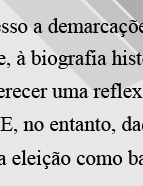

................................
The clear preference of these authors for thinkers and writers adapted well to the precedence given to external conditions over individual action, the model of the study of life and work, ironically typical of the radically elitist conception of literary history and art, serving as their gateway to observing social conditions or major historical processes. These individual paths were nevertheless recognised as relevant—such as in António José Saraiva (particularly in the various texts he wrote on Fernão Lopes), Óscar Lopes (who, besides major works, also took part in the aforementioned edition of Os grandes portugueses), and Fernando Lopes Graça, all of whom dedicated part of their research to the lives and works of eminent figures in Portuguese culture (V. Sá, Antero de Quental, 1963,p.22).
On the other hand, this selection of subject matter reflected the adaptation of the life narrative to both Marxist ideologies and methodologies. Some of these left-wing authors were not unfamiliar with an avant-garde conception of history, in which specific figures, due to their particular qualities, were seen as "leaders" or "interpreters" (in politics as well as in literature) of the so-called fundamental movements—but also, as in the more conventional version of biography, as "lessons" or "practical" examples for future generations. This civic engagement in the act of biography, despite being primarily aimed at peers and the university audience in general, largely sustained the significant biographical production of authors such as Vítor de Sá: from the undergraduate dissertation dedicated to Amorim Viana, to comprehensive works on Antero de Quental, and to post-revolutionary works around figures of nineteenth-century Liberalism. This universally shared predilection for major figures did not negate the holistic approach that characterised these works, as was the case with António Borges Coelho, especially in his characterisation over the years of the expansionist process. His first foray into the biographical genre, in the mid-60s, still in the early stages of his career, was with the portrait of Alexandre Herculano, published in the "Biografia de bolso" collection by Presença; only in the 1990s did he extensively delve into a personality of his choice, namely João de Barros or, after the turn of the century, D. João de Castro (suggestively, in the "Biografias" series by the unsuspecting Caminho). However, there was no novelty in this apparent interval or in this apparent openness to conventional characters. A closer look at the author's work sheds light upon an interest in both major and minor figures, from those who were left to rot in the dungeons of the Inquisition to those who led the Expansion movement—all, as he always said, were "people of flesh-and-blood " whose names, profiles, and actions populate his work (v. José Neves, “Marxismo”, in this Dictionary; V. Sá, A mocidade de Antero, 1942, pp. 11-12, e Antero de Quental, 1963: 9-24)
